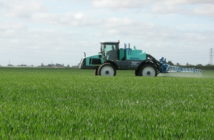Despite favourable conditions giving oilseed rape crops a strong start, growers are being urged to pay close attention to nutrition ahead of winter, as tissue testing has highlighted deficiencies.
The early harvest provided the opportunity for prompt oilseed rape establishment, and with ample rain in some areas, crops are growing well.
Chris Bond, crop nutrition product manager at FMC, explains that tissue testing results show increasing nutrient deficiencies – particularly magnesium, sulphur, zinc and boron – which could compromise crop resilience heading into winter.
He notes that following the wet winter last year and the dry summer, magnesium, sulphur and boron have leached from soils. Zinc availability could also be limited if conditions change to cold and wet. “Without intervention, crops may struggle to maintain strong growth and resilience as they move towards dormancy.”
Chris explains that developing a robust canopy before winter ensures continuous photosynthesis, while a healthy root system allows crops to scavenge for nutrients and withstand stress.
“Micronutrients like boron and molybdenum support root development and nitrogen use efficiency, while magnesium underpins photosynthetic capacity and zinc improves cold tolerance.”
To address these deficiencies, FMC is advising growers to consider targeted foliar nutrition.
“A foliar application ensures nutrients go straight into the plant, bypassing the risk of lock-up or leaching in soils,” says Chris.
FMC’s Stoker delivers a balanced package of boron, molybdenum, sulphur, magnesium, manganese and zinc, add Chris. “Applied from the four-leaf stage through to winter dormancy, it gives crops the resilience they need to stay strong through winter.
“Crops that entered the ground early have already built biomass, so the focus now is on maintaining their health. With targeted nutrition, growers can protect that potential and set crops up for a productive spring.”




